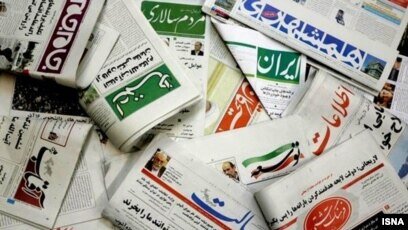The new excuse of the U.S. in negotiations

In a commentary, Shargh discussed the recent negotiations between Iran and the United States on the release of dual-citizen prisoners and said: While the authorities of Iran, the United States and Oman are pinning hope on future negotiations to release dual-citizen prisoners, recently the issue of the existence of a fourth prisoner and his exchange was also discussed.
It was said that efforts to reach an interim agreement between Iran and the United States had failed because the ruling faction in Iran have not reached an understanding on the American demands regarding the release of prisoners. But the recent evidence shows that Tehran-Washington bilateral negotiations to release the prisoners have been resumed and probably the U.S. request to determine the fate of the fourth prisoner has also been accepted by Iran. Because firstly, due to economic reasons, Raisi's government is trying to release some of its blocked assets in regional and extra-regional countries, and secondly, with the approaching election season, Biden has tried to start negotiations with Iran in Muscat on issues related to prisoners with dual-citizenship. Again, this will be a “winning card” for him in the election campaigns.
Javan: Islamic Republic is harbinger of security and stability in West Asia
Javan addressed Iran's authority in the region and wrote: Politicians and experts in the Middle East countries believe that strengthening the strategy of involving neighbors in the region will create a balance in regard to the great influence of the United States in the region and restore geopolitical justice.
So the move toward multi-polar world will start from the Middle East. The efforts by Iran and Russia to solve military, political and regional crises, the revival of relations between Tehran and Riyadh, as well as the strengthening of diplomatic relations and the expansion of economic, political and military cooperation among the Middle East countries will lead to the end of the U.S. neo-colonialism in the region. And the plan to normalize relations between the Arabs and the Zionist regime will end in failure and they will be isolated. On the other hand, Iran is interested in cooperation with the Arabs.
The Arabs are also aware of the power of the Islamic Republic to create security in the region because whenever they thought that security arrangements would be defined without the involvement of Iran in the region, they faced a failure. The Arabs who tended to refer to Iran as a great threat are now realizing that Iran has turned into a harbinger of stability and creating opportunities in the region.
Vatan-e-Emrooz: Israel's plan did not work out
In a note, Vatan-e-Emrooz addressed the failure of Israel's imaginary scenario to compensate for its security-military failures in the disappearing story of a person related to Mossad.
The paper wrote: The Zionist regime with an imaginary scenario of an attempt on the lives of Zionists in Cyprus by Yousef Shahbazi declared that it had tracked down the operation and kidnapped Shahbazi. But Israel is seeking to cover up the arrest of its dual-national spy, Elizabeth Tsurkov, by Shia forces in Iraq. In order to marginalize the issue of Tsurkov's arrest, the Zionist media claimed that Iran and Israel are seeking to exchange Yousef Shahbazi Abbas Aliloo with the mediation of Russia. But Iran denied the news and called it a worthless propaganda. The Palestinian resistance and the weekly protests of Israeli citizens living in the occupied territories, who are opposed Netanyahu’s judicial amendments, have caused the security of this regime to be shaken from within. Moreover, such pressures have forced Israel to create false scenarios in order to restore the image of its security system.
Ham Mihan: The new surprise of Middle East
Ham Mihan analyzed the negotiations between Egypt and Iran and wrote: The ruler of Oman, with the support of the Leader of the revolution and the president of Iran, is trying to normalize Iran-Egypt relations this year. If the relations between Iran and Egypt are restored, Washington's declining role in influencing regional dynamics will be revealed once again. But the biggest loser of the normalization of relations between Iran and Egypt will be Israel.
Considering Iran's strong diplomacy and the revival of its relations with the countries of the region, especially Saudi Arabia, as well as Syria's re-admission to the Arab League, Israel feels threatened. Because the prospect of negotiations of Iran with Egypt is to lessen its partial isolation in the Arab world and to weaken the efforts of America and Israel to form an Arab front against Iran.
Leave a Comment